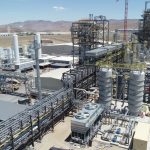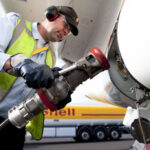Japanese industrial group ITOCHU Corporation and Finnish renewable energy company Neste have announced collaborative agreements to help expedite the introduction of sustainable aviation fuel in Japan. Their commitments align with the Japanese government’s 2030 goal to replace 10% of all fossil aviation fuels with SAF. The companies have signed deals to provide SAF to Japan Airlines, initially for two test flights very shortly, and a separate MoU to explore further SAF supplies to the airline in 2023. Additionally, ITOCHU has been selected by the Japanese government to demonstrate blending in Japan of imported SAF with conventional jet fuel, in partnership with Fuji Oil Company. The blending will occur in January, and in February a portion of the mixed product will be tested in aircraft owned by the Japanese Civil Aviation Bureau. Meanwhile, Neste has agreed to supply Air France-KLM with more than 1 million tonnes of SAF over a period of eight years starting in 2023 and FBO Signature Aviation has expanded access to Neste’s SAF in California for business aviation users.
ITOCHU is a key partner in Japan’s plan to transition to SAF, and a local distribution partner for Neste. It intends to introduce commercial-scale domestic production of SAF. In October 2020 it facilitated the nation’s first SAF import, for use by All Nippon Airways, and last year was part of an industrial consortium which produced SAF from biomass materials. In February this year, ITOCHU expanded its alliance with Neste to provide SAF to Tokyo’s Narita and Haneda airports, and is planning to supply other airports including Chubu Centrair in FY 2022 and Osaka’s Kansai International Airport in FY 2023.
Japan Airlines has committed to replacing 1% of its conventional aviation fuel with SAF by FY 2025, and 10% by 2030, and as a member of the oneworld airline alliance it has also signed future SAF offtake agreements in the US. Under its agreement with ITOCHU, JAL will use Neste SAF, mainly produced from waste fats, oils and greases, to part-power a “sustainable charter flight” on 18 November, in which it will fly from Haneda to Naha Airport, Okinawa, a 1,555-kilometre journey of just under two hours. Neste SAF will also be used shortly on a scheduled JAL flight from Los Angeles to Japan, though no details have been released of the volume to be used.
“The Airbus A350 aircraft, which emits 15-25% less CO2 than conventional aircraft, will be used to operate the sustainable charter flight,” said JAL. “By using sustainable aviation fuel and exercising JAL’s Carbon Offset, the flight will achieve net zero CO2 emissions.
“By the end of first quarter 2023, Neste plans to start SAF production at its Singapore plant, which is anticipated to have an annual production capacity of 1 million tonnes. JAL seeks to continue its cooperation with Neste and ITOCHU to procure SAF both globally and domestically.”
Beyond the JAL agreements, ITOCHU Corporation has also been chosen by the Japanese Civil Aviation Bureau to demonstrate the blending of imported SAF and conventional aviation fuel. “The aim of the project is to demonstrate the blending of imported neat SAF locally in Japan, which helps the country prepare for when significantly larger quantities of SAF will be needed to help the aviation industry achieve its ambitious emissions reductions goals,” said ITOCHU.
In its latest ESG report, the company’s President and COO, Keita Ishii, said ITOCHU would “aggressively promote businesses that contribute to global greenhouse gas reductions. We will contribute to resolving major social issues by promoting a decarbonised and recycling-based society, and by establishing a resilient value chain, including promoting sustainable raw materials procurement.”
Sami Jauhiainen, Neste’s VP Asia Pacific for Renewable Aviation welcomed the opportunity to support Japanese airlines and the Japanese government in targeting the replacement of conventional jet fuel with 10% SAF by 2030. “This demonstration project solicited by the Japanese Civil Aviation Bureau is an important step on the pathway towards realising that goal, as it demonstrates the blending of neat SAF with fossil jet fuel from a domestic refinery in Japan,” he said.
Last month, ITOCHU and Neste provided blended SAF to Etihad Airways, the national carrier of the United Arab Emirates, for a series of flights from Narita to Abu Dhabi – the first non-Japanese airline to use the new supply. Etihad committed to take approximately 50,000 gallons of SAF, with the first of the Boeing 787-9 flights operating with a blend of just under 40%, and reducing carbon emissions by approximately 75.2 tonnes. As well as net zero emissions by 2050, Etihad has also committed to halving its 2019 emission levels by 2035.
Meanwhile, Neste has announced further supplies of its SAF product in Europe and the United States. In an expansion of its existing cooperation with Air France-KLM, Neste will supply the airline group with more than 1 million tonnes (1.26 billion litres) of SAF over a period of eight years starting in 2023. The SAF producer says it is one of the largest agreements of its kind in the aviation sector to date.
“This announcement marks a significant next step forward in our cooperation with Air France-KLM Group and underscores how we continue to support companies in reducing their greenhouse gas emissions,” said Neste CEO Matti Lehmus. “Neste aims to help customers cut emissions by at least 20 million tonnes of CO2e annually by 2030 with our renewable and circular solutions.”
Air France-KLM is looking to reduce its CO2 emissions per passenger/km by 30% by 2030 compared to 2019 – a target submitted to SBTi – and is aiming for a 10% incorporation of SAF by the same year. It has been working with Neste since 2019, with KLM being one of the first airlines to use Neste’s SAF.
“This landmark partnership with Neste is an important and concrete step towards the decarbonisation of our operations,” said Fatima da Gloria, VP Sustainability at Air France-KLM. “This contract embodies our long-term commitment to the development of SAF production capabilities around the world, to the benefit of the industry as a whole.”
In the United States, business aviation users now have greater access to SAF in California after the world’s largest network of Fixed-Base Operations (FBOs), Signature Aviation, announced it is to expand the availability of Neste’s SAF to all its 10 locations in the state. The two companies began a partnership in 2020 and under it they will deliver over 29 million gallons of 30/70 blended SAF, reducing over 62,000 tonnes of GHG emissions.
“Two years ago, we announced our first permanent supply of SAF for private aircraft in San Francisco. Since then, we’ve maintained a sharp focus on investing in the supply chain, collaborating with our customers and expanding availability with Neste,” said Beatrice Batty, Director Fuel Operations for Signature Aviation. “The result today is the 10 Californian locations that can decisively provide the solution to reducing private aircraft carbon emissions.”
The expanded availability is enabled by Neste’s growing capacity, said Neste. “SAF is recognised as the most effective way to reduce the GHG emissions from air travel and is an important solution to reach the business aviation industry’s pledge to achieve net zero carbon emissions by 2050,” commented Chris Cooper, President of Neste US. “Together, Signature and Neste are meeting the industry’s growing demand by increasing the volumes and locations where customers can have easy access to SAF to achieve their bold climate goals.”
For Signature Aviation, the expanded availability of SAF in California represents a central objective of Signature Renew, its company-wide sustainability initiative. It is the first FBO worldwide to offer a permanent supply of SAF, with the option available for privately-operated aircraft at aviation service facilities in California, Colorado, Washington, Alabama, Texas and the United Kingdom.
Photo: Japan Airlines A350-900
Additional reporting by Christopher Surgenor













More News & Features
SAF One announces new investment and technology partners for Middle East SAF project
New studies confirm minor flight re-routing to avoid contrails would have major climate benefits
New initiative formed to accelerate SAF adoption and production in the Pacific Northwest
EcoCeres opens new Malaysia production facility as SAF ambition in Asia scales up
Aviation, shipping and fuel leaders convene in Rotterdam to accelerate sustainable fuels scale-up
EU SAF mandates will have to be revised, predicts French oil chief